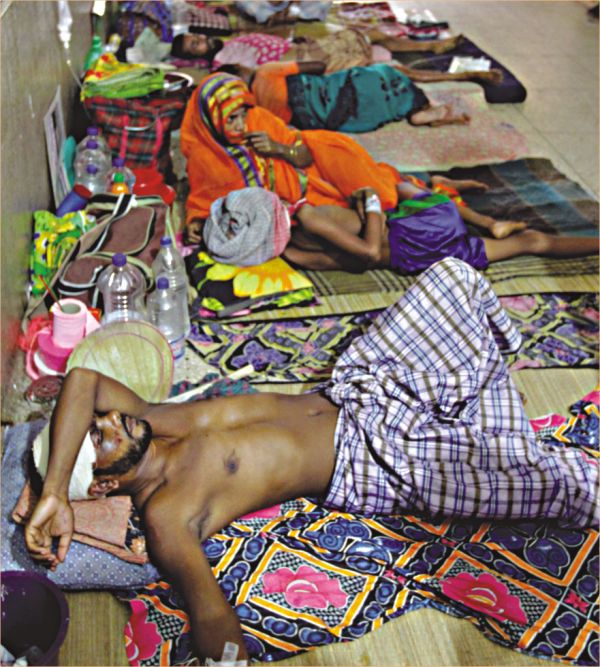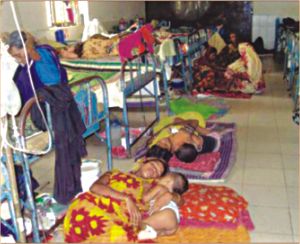
Inside
Original Forum |
| Causes of RMG unrest -- Refayet Ullah Mirdha |
| Who Pushes the Price up? -- Asjadul Kibria |
| Padma Bridge: Dream vs reality -- Mohammad Abdul Mazid |
Self-financing Padma Bridge -- Nofel Wahid |
| Unaccountability in Private Medical Services -- Mahbuba Zannat |
Medical Waste --- Mushfique Wadud |
Abysmal state of Emergency Medical Services |
On Clinical Negligence -- Eshita Tasmin |
The Population Growth Conundrum -- Ziauddin Chowdhury |
| Rohingyas and the 'Right to Have Rights' -- Bina D' Costa |
| Two-State Solution: Israeli-Palestinian Peace -- Dr Kamal Hossain |
| Forms of Government -- Megasthenes |
A Letter from Alghamdy and War Crimes Trial |
Unaccountability in Private Medical Services
People's dependency on basic healthcare services are growing on private medical hospitals or diagnostic centres, thanks to poor and inadequate facilities at the public hospitals but zero monitoring on the part of the government has left patients at the mercy of private clinics, reveals MAHBUBA ZANNAT.
 Photo Star
Photo Star
There was a time, when an expert doctor could diagnose diseases by feeling the pulse of a patient. But nowadays we cannot even think of it. Thanks to the excellence of modern technology and medical science, we have begun to rely more on 'what a machine says.' It has resulted in a sprawling growth of a huge number of diagnostic centres. Currently a total of 5361 private diagnostic centres are running in the country. Of them, 1026 are running in the capital with government license. It is uncertain exactly how many are running illegally.
Patients come out of these diagnostic centres with various complaints. The most common complaint is different diagnostic centres charge differently for the same test. Besides, the reports also vary. A patient often needs to go to two or more diagnostic centres to be sure of the authenticity of the reports. But who cares? It is as though the private diagnostic centres are there for doing business only, not to provide service to the patients.
However, to regulate medical practice and functioning of private clinics and laboratories, an ordinance was prepared in 1982. It was called “The Medical Practice and Private Clinics and Laboratories (Regulation) Ordinance.” It fixed the rate of different tests and the maximum fees for laboratory investigations for 105 tests. The charge for electrocardiogram (ECG) was fixed at Tk 60. Fees for different types of tests ranged from Tk 8 (for hemoglobin test) to Tk 200 (for Fluroscent trapanosomal antibody test). After 30 years, however, the ordinance has lost its efficacy and control over the booming number of private diagnostic centres what with the emergence of more modern methods of diagnosis and reagents.
Nowadays we cannot think of going for a hemoglobin test at Tk. 8 neither from public nor private laboratories. What we expect is a ceiling on the test fees so that patients have choices and can opt for better diagnostic facility that his income permits. The authorities too felt the necessity of modernizing the ordinance as private diagnostic centres now play a key role in diagnosing diseases. The ordinance was slightly amended in 1984. After that, a long time has passed without any further change to or modernisation of the amendment. However, an act was prepared in 2004 in congruence with the patients' needs and business sector. It was taken to the parliament too, but has not seen any progress till very recently.
The Directorate General of Health Services (DGHS) has updated the act. Called Private Medical Service Act 2010, it says the charges must be fixed by regulations. The fees must be displayed for the patients and if the authorities do not follow it properly, the licensing authorities can fine them. The standard of the diagnostic centres would also be fixed by a regulation. It was sent to the ministry a few months back but the ministry of health has been sleeping on it.
Despite continuous compliant of wrong reports and excessive fees, the act is yet to be passed and most people involved with the health services sector know who are responsible behind this undue delay: the owners of private diagnostic centres and hospitals. A high official of the DGHS has told this writer that the owners are too powerful to be budged. The whole private medical sector is held hostage to this moneyed group and nobody seems to dare to go against them.
Upon visiting some of the private diagnostic centres in the capital, it was learnt that none of them displays the list of their test fees, whereas the ordinance and the proposed act provide strict guidelines about displaying the types and fees of the tests. Perhaps it is not always possible for the hospital or centre authorities to display charges of all the tests given some of them have as many as 25,000 or 30,000 tests. But it does not mean they will not provide and display even the commonest 50 or 100 tests. Therefore, the number of thousands of tests comes as a lame excuse. It becomes more obvious when one sees that displaying the names of specialized doctors who are offering part time services there is not much of a problem although it is more difficult and expensive than that of the list of tests with their costs. It easily turns out that providing services with accountability is not so important to them as making money.
 |
|
Photo Star |
Now let us come to the point of anomaly. Suppose you visited Popular Diagnostic Centre for abdomen ultrasonogram. It will take you Tk 1200. On the other hand, if you visit Modern Diagnostic Centre, the doctor who will charge you Tk 2000 for the same test. What is the reason behind this discrepancy? The centre charging obtrusively higher has its answer. Its authorities will say that they are using the lastest and high quality equipments to diagnose. They will also say their machines read more effectively and the reagents they are using for the tests are also better. Although it is impossible for us laymen to comprehend the true technical difference, this explanation simply does not wash. In fact, in the absence of an effective monitoring body to ensure accountability, these private medicals are literally given a free hand in charging arbitrary fees.
The laboratory authorities often say that they have discount for the poor patients, which is not true. They have discount only for the members of Dhaka Club and Gulshan Club. A member of Dhaka Club has told me that he enjoys 25 percent discount on different tests at a very famous diagnostic centre. Members of these clubs are from the affluent class and offering discount to them does not take the loads off from the lower and lower-middle classes.
After talking to the President of Bangladesh Association of Radiology and Imaging Technologists, I came to know that very few of these private diagnostic centres have skilled health technologists. The Association's President Mofazzal Hossain told me during an interview that private hospitals and diagnostic centres are not recruiting skilled health technologists for a couple of years because if they so do, they will have to pay more. That is why they prefer unskilled employers who would learn gradually after working on patients. That is precisely why complaints from patients receiving wrong diagnosis or treatment are so high. This is another proof that these private centres care more about money than about the service.
Now time has come to turn to the doctors. If you tell them about the real conditions, they will act as if they are struck by lightning. They will rather make you believe the saga of technological revolution in health service. But when you get his prescription, what you find written in it is not a set of rules or some medicine but some three or four tests. What part of your body has been affected matters little. The commonest tests are ESR, ECG, CT Scan, X ray and ultrasonogram. It is now an open secret in the health service sector that doctors get 30-40 percent commission for the tests they prescribe. In many cases, they mention their preferred diagnostic centres. If you miss the point, if you get the tests done from another diagnostic centre, then instances are aplenty that your test reports will be rejected and you will be redirected to the mentioned centre. In a sense, patients are also held hostage by private medical doctors and hence are forced to give in to their treatment methods which have integrated so nicely with the diagnostic centres that none can go beyond this network.
Some low profile diagnostic centres have earned a bad name for engaging brokers at public hospitals. These brokers allure the patients and take them to those specific diagnostic centres to get 'quick and authentic reports'.
The government laxity
The Hospital and Clinic wing of the DGHS is responsible to ensure accountability of these private diagnostic centres. The licensing authority has the power to visit the centres and to take necessary steps against them. But apart from some sporadic drives conducted by a mobile court, we have hardly seen the authorities take actions against the centres. Shortage of manpower at the DGHS is a setback but the real problem lies in the government's laxity. An overarching issue such as the healthcare services deserves a lot more attention from the government. Our constitution also guarantees fair treatment to all its citizens. Therefore, the Private Medical Service Act 2010 must be passed and updated so as to put heavy brakes on the anomalies and unaccountability of private medical services. An effective mechanism for continuous monitoring is similarly necessary to bring to book the flouters of medical laws.
Mahbuba Zannat is a journalist.